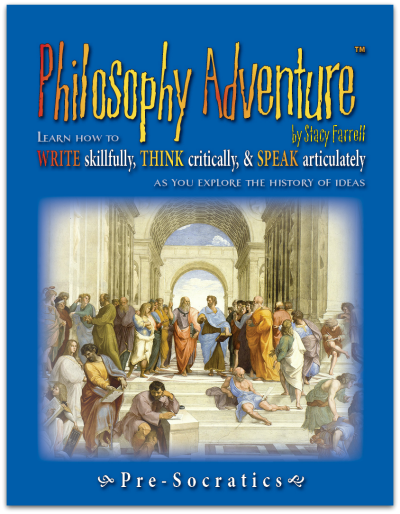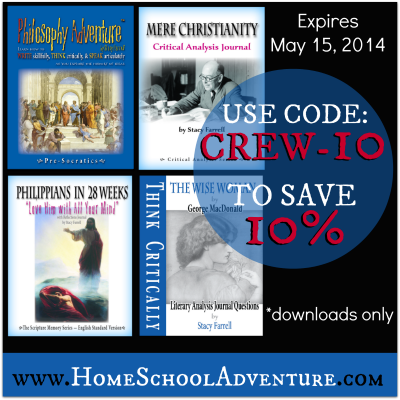Schoolhouse Review Crew Members recently reviewed several downloadable titles from Home School Adventure Co..
- Philosophy Adventure
- Mere Christianity Journal
- Philippians in 28 Weeks
- The Wise Woman with Literary Analysis Journal Questions
Philosophy comes from the Greek word, philosophia, and literally means "love of wisdom." Essentially, philosophy is the discipline that explores the answers to the three deepest questions with which humans wrestle:
- Where did I come from and why am I here?
- Why is there evil, suffering, and death?
- Is there hope for my future?
With Philosophy Adventure, you can equip your teens to discern all of the ungodly ideas of the past and present and encourage them to not be taken captive "through hollow and deceptive philosophy which depends on human tradition and the elemental spiritual forces of this world rather than on Christ." (Colossians 2:8)

The Curriculum
Philosophy Adventure is a complete curriculum in which students will study the history of philosophy and the influence of ideas. It is designed to help mature 6th graders and up develop and defend a biblical worldview by helping them learn how to write skillfully, think critically, and speak articulately. Students in high school should be able to manage this course on their own while students in middle school may need help.
Children in high school who use this curriculum can earn credits in English, History, Geography, Logic, and more. A detailed breakdown of credits that can be earned is found in the introduction of the Reader. Philosophy Adventure can be used as a primary curriculum or as a supplement. If used as a primary curriculum, it should take about one semester or less to complete, and you will want to make sure and add subjects not covered in the curriculum like Math, Science, etc.. If used as a supplement, your child can move at a slower pace. A suggested 4-5 day schedule is included in the Reader to help students manage their time, but it can be easily adjusted to adapt to their specific needs.
Philosophy Adventure covers a broad variety of subjects focused on the lives and ideas of eight philosophers:
- Thales
- Pythagoras
- Xenophanes
- Heraclitus
- Parmenides
- Empedocles
- Protagoras
- Democritus
- Reader
- Student Workbook
- Teacher's Resources
Reader
The Reader is where students will meet each philosopher and learn all about their lives and ideas. It is visually appealing (huge plus for a visual learner like me) and presents information in a consistent, easy-to-use format.
Lessons are about 10 pages in length, and there are several components that repeat in every lesson: story of the philosopher's life, Write, Think, and Speak articles and assignments, geographical information, School of Thought the philosopher participated in or founded, and a Contrast section that includes primary sources if available, secondary sources, and how the philosopher's ideas do or don't align with a biblical worldview.
Also included throughout each lesson are important words in bold letters such as vocabulary, dates, people, and places. Significant details - Birth, Death, Works, School of Thought, and Contemporaries - are featured on the right side of the first page of each lesson as you can see in the image above.
Student Workbook
The Student Workbook contains Notebook Pages, Maps, and Creative Freewritings for each philosopher; Write, Think, and Speak Journal pages for each philosopher; Checklists for writing papers and giving speeches; and a Glossary in which terms and page numbers are given but students fill in the definitions.
The first part of the Student Workbook is pretty straightforward - answering questions from the text, filling in information on maps, and completing free writing assignments. The Journal takes things one step further by encouraging students to think about and apply what they've learned to their own lives. For instance, the first few questions my son encountered in the journaling section were:
- Where did I come from and why am I here?
- Why is there evil, suffering, and death?
- Is there hope for my future? If not, why? If so, what is the source of that hope?
I think the Journal portion is a wonderful part of the curriculum as it forces students to really think about answers to difficult questions, however, there were a few times some of the questions and assignments were vague and confusing. This can be frustrating for kids who want to be told exactly what to do.
One example in the second lesson that caused a bit of confusion for my son was when the Journal asked my son to write answers to a set of questions based on a text of his choice. To us, it was unclear if that text should come from within the curriculum (choosing one of the philosophers) or from without the curriculum, and if so, what sort of text then? My son ended up choosing an outside source, but some suggestions to help narrow down a source may have been more helpful.
Teacher's Resources
Teacher's Resources contains Memory Cards, Timelines, Maps with answer keys, and Quizzes with answer keys. There are no answer keys for the notebook pages, though, so students need to make sure they are filling in the correct information from the text.
Memory Cards can be printed on cardstock and are a great tool for studying for quizzes. Timelines are also a great tool for enhancing the overall learning experience. There are three timelines: master timeline of ancient Greek philosophers, blank student timeline, and student timeline key. Over forty images of philosophers can be printed off and affixed to the student timeline as they are encountered in the lessons.
I found one very minor mistake in the Teacher's Resources - when I went to grade my son's first quiz, Thales, I thought the answer key was missing at first. Upon closer inspection, I saw that it was only out of place. The red arrow shows where it should be. Not a big deal, just wanted to clear up any confusion for those who purchase this curriculum. :)
How We Use Philosophy Adventure
Memory Cards can be printed on cardstock and are a great tool for studying for quizzes. Timelines are also a great tool for enhancing the overall learning experience. There are three timelines: master timeline of ancient Greek philosophers, blank student timeline, and student timeline key. Over forty images of philosophers can be printed off and affixed to the student timeline as they are encountered in the lessons.
I found one very minor mistake in the Teacher's Resources - when I went to grade my son's first quiz, Thales, I thought the answer key was missing at first. Upon closer inspection, I saw that it was only out of place. The red arrow shows where it should be. Not a big deal, just wanted to clear up any confusion for those who purchase this curriculum. :)
How We Use Philosophy Adventure
My oldest son, who is almost a sophomore, is the one using Philosophy Adventure. During the review period, I printed off all of the materials from the Student Workbook and Teacher's Resources my son needed to complete the first 3 lessons, in other words, the first 3 philosophers. I did not print The Reader since my son was able to read the text on his Kindle Fire.
To organize all of the printed materials, he used a 3 ring binder divided into three sections: Notebook Pages, Journal, and Checklists. He used the pockets for storing his Memory Cards and quizzes. We did not make a section for Timelines, though you could include that as well.
I let my son go at his own pace, and he was able to complete 3 lessons during the review period. So, he covered 1 philosopher about every 2 weeks. After reading a lesson, he worked on notebook pages and maps before moving on to the journaling portion. To get ready for a quiz, he matched the Memory Card questions with their answers and then studied them for a day or two. Finally, he'd take his quiz.
I didn't really put a huge emphasis on the timeline or glossary portions but may include those components when we continue the course for the 2014-2015 school year.
Our Opinion
My son and I both like the curriculum, but my son says he would like it better without the journaling section. This does require a little more brain power! Plus lots of thinking and writing. There are parts of the journal, such as the personal questions, that I really like and think are important, though, so as we continue the course, maybe we can come up with some sort of compromise. :)
I like the design of the Reader and appreciate all of the important details at a glance throughout the text. I especially like seeing who the contemporaries are. I also think it's great that we get to see how the philosophers' stories end and how their philosophies played out in their own lives. I am certainly looking forward to reading about the remaining philosophers.
I thinks it is extremely important for my kids to realize that many of these so-called "Great Thinkers" maybe weren't so great after all. It's definitely important to me that my kids understand that all the treasures of wisdom and knowledge are hidden in Christ so that they'll be able to stand against the fine sounding arguments the world has to offer. (Colossians 2)
If you are looking for a way to teach your older children about philosophy that's not at all intimidating or overwhelming, and that focuses on the importance of a biblical worldview, I think you will like Philosophy Adventure.
Cost
The complete Philosophy Adventure digital download is available for the reasonable price of $39.95. For a limited time, save 10% on any download purchase from Homeschool Adventure Co..

And don't forget to click the banner below to read about all of the Homeschool Adventure Co. products the Crew reviewed!
Social Media Links
Facebook: https://www.facebook.com/HomeSchoolAdventureCo
Twitter: http://twitter.com/HomeSchoolAdven
Pinterest: http://pinterest.com/HomeSchoolAdven
Google+: https://plus.google.com/u/0/b/115241518288669984312/+Homeschooladventure/
Instagram: http://instagram.com/HomeSchoolAdven
Twitter: http://twitter.com/HomeSchoolAdven
Pinterest: http://pinterest.com/HomeSchoolAdven
Google+: https://plus.google.com/u/0/b/115241518288669984312/+Homeschooladventure/
Instagram: http://instagram.com/HomeSchoolAdven









No comments:
Post a Comment